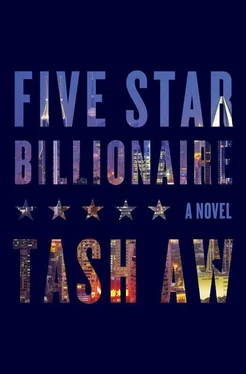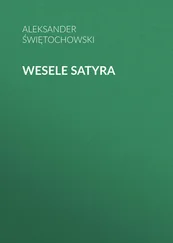Yinghui went into the office and retrieved the dossier she wanted, locking the door behind her as she left. When she got back to the car, Walter was typing on his BlackBerry, his head bowed, frowning in concentration.
“Sorry about that,” Yinghui said. “I ran into the errant ex-manager, who’d snuck in unnannounced — probably to steal things, though she denies it.”
“Oh, really?” Walter said, looking up. “I didn’t even notice.”
“Well, anyway, she’s gone now — for good, hopefully. These people are all the same. Hey, you look tired. I can easily catch a cab home, you know; you don’t have to drive me all the way back.”
“No, really, it’s fine. I just got a bit stressed by an email I was typing.”
They drove in silence, but Yinghui did not feel awkward. It was good that she had reestablished her personal and professional boundaries with Walter, she thought; that evening had proved that she could indeed master her emotions in the face of upheaval.
As Yinghui got out of the car, Walter promised that he would be in touch very soon to arrange a meeting about their future project, which he was looking forward to greatly. He said he would call within a few days, a week at the latest, because he could feel that this was going to be an amazing project and that they should start work in earnest.
HOW NOT TO FORGET — PROPERTY CASE STUDY, CONCLUDED
We took the bus down to Kuala Lumpur. The rains had started early that year, and the stretch of road down to Kuantan got flooded, forcing the bus to take a detour. We rode long hours through the night. When we stopped at Kuala Lipis, we bought some curry puffs and mee Siam that later made my stomach churn, knotting my insides until I was bent over in pain. My father, however, was in high spirits — he kept talking about what he would do with his business once we got approval to keep the building. He would take out another loan and invest in a mechanized cleaning system to process the birds’ nests — that would be cheaper than hiring Indonesian migrant workers, the way other people did. The birds’ nests would be more hygienic and aesthetically pleasing and would therefore command a higher price, and the quality of his product would be such that he would even be able to get an ISO 9000 certification for it. He would start a chain of shops, bearing my name — his legacy to me. He spoke about these ventures as if they were a real possibility, as if the hotel belonged entirely to us and was bursting with nesting birds — as if it were not empty and boarded up and about to be torn down.
“What’s the matter with you?” he asked.
“Nothing.” My stomach was twisted on the right side, and occasionally there would be a shooting pain in my kidneys.
“Serves you right for eating so many curry puffs,” he said.
He talked through the night, detailing his plans as we rode slowly over the potholes and pools of floodwater collecting in the middle of the road. Outside, the rain had lightened to a steady drizzle; as the road cut through the unending plantations of rubber and palm oil, the headlamps of the bus cast a stark pool of light that suddenly illuminated the military-straight rows of trees before leaving them in darkness once more. Slowly, as dawn began to break, my father finally fell asleep. We were just entering the outskirts of Kuala Lumpur, with its vast flat housing estates of small single-story link houses separated by chain-link fences, each one indistinguishable from the other; the factories that made tires and refrigerators and VCR sets; the cheap Chinese groceries starting to open their heavy metal shutters, the shopkeepers hanging combs of ripening bananas along the tops of doorways, as if they were decoration. I had not slept all night and I was beginning to feel drowsy, the cityscape appearing misty and dream-shrouded in my fatigue. The twisting, stabbing pain in my gut continued, and when we finally pulled in at the bus station I had to rush to the toilet, simultaneously nauseous and diarrhetic.
My father had an address written down on a piece of paper he kept in his shirt pocket, a page torn from a school notebook, folded and refolded many times and now beginning to get soft and rumpled with the sweat from his shirt. We walked for a long time — the city was full of hot concrete, the air unmoving — before finding the address, a modern high-rise block, twenty-eight stories all told, dressed in steel and shiny blue-green windows that reflected the clouds and the sky and hid the people who worked within. In the smooth paved forecourt and at the very top of the building, there were big red letters announcing its name, the kind of signage that would remain lit throughout the night: WISMA L.K.H.
I thought the security guard was going to stop us at the door, but he did not — he allowed us to walk through to the reception desk, where two old Chinese men studied us as we approached, their faces betraying no emotion at all. One of them had been reading the Nanyang Siang Pau —I can still remember its headline: USSR SHOOTS DOWN KOREAN AIRLINES 747. The thin rubber soles of my Fung Keong sneakers kept squeaking on the polished terrazzo floor as we walked across the lobby; it seemed to be the only noise present.
My father introduced us and stated our purpose in visiting Mr. Lim — there he had to take out the piece of paper from his pocket — Mr. Lim Chee Huat, the man in charge of the property division.
“Do you have an appointment with the managing director?” one of the men asked.
My father shook his head. He was still smiling, as if he did not understand why we would need an appointment. I was embarrassed, because I already sensed that this was how the sophisticated world of business worked. Appointments, dates, times, names. This was how rich, successful people lived.
“Then it’s not possible. He’s a busy man.”
“But,” my father continued, still unhesitating, still uncomprehending, “it is very important. It’s about our home.”
The two men looked at us with unchanging facial expressions. I thought they were suddenly going to lose patience and call for the security guard. I looked down at my shoes, noticing how the canvas was worn and soiled against the shiny floor. My hands and fingernails were dirty. I wanted to leave.
One of the men looked at me. “Where are you from?” he asked.
“Kelantan,” my father replied on my behalf. “We just arrived.”
“Kelantan,” the man repeated. “My mother was from Kelantan. How old is your son?”
“Nineteen.”
“Nearly a man.” He looked at me, and in his regard I saw what I then took to be kindness, but now, looking back, I recognize that it was pity.
He picked up the phone and muttered a few words I couldn’t hear. He put the phone down and said, “This is your lucky day. The boss is supposed to be on leave today, but he came in for a few minutes and his secretary says he is free. I will take you up there.”
We took the lift to the eighth floor and sat on a soft brown sofa in the waiting room. My father was humming a happy repetitive tune I didn’t recognize. His optimism made him oblivious to the dangers that lay ahead.
“This man, Mr. Lim — he’s not your friend at all, is he?” I said.
“Of course he is, you’ll see. When he sees me he will greet me just like a brother, because I am a friend of Nik’s. It’s how old-style friendships work. You young guys don’t understand how we old men work — everyone helps one another. We’re all simple village people; we don’t make enemies and squabble the way you youngsters do.”
Eventually a young woman came and led us down a corridor lined with old black-and-white photographs of rubber plantations and tin mines and the occasional portrait of an old Chinese towkay , stiff and formal, almost petrified before the camera. My father was still humming his little tune, walking with a spring in his step, as if impatient to find a long-lost friend.
Читать дальше
Конец ознакомительного отрывка
Купить книгу


![Scott O’Hara - Five-Star Fugitive [= Border Town Girl]](/books/432138/scott-o-hara-five-thumb.webp)









